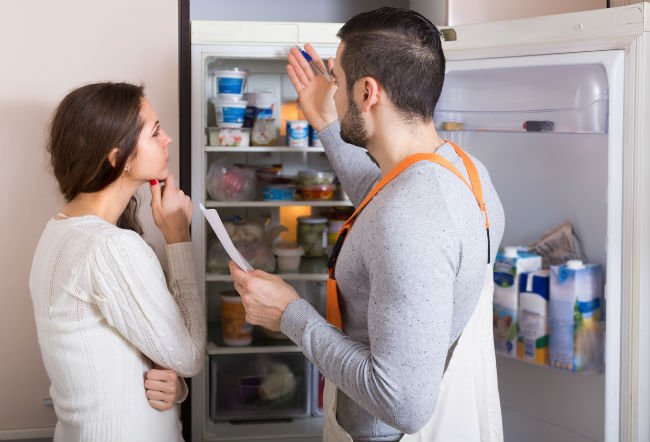You’ve spent the whole day outside enjoying the warm weather and soaking up the sun. You go to the fridge to get a nice, cold bottle of water, but wait, it’s warm. Everything in the refrigerator is warm!
If you’re here to figure out why your refrigerator is not working, keep reading. We’ll go over potential reasons for issues below.

The Problem Isn’t With the Fridge
Before we get into specific issues that may cause your refrigerator to stop working, we’re going to apply Occam’s razor to do some troubleshooting. First, is the unit plugged in? While that seems like an obvious question, it’s easy for appliances to become unplugged if they are moved accidentally, especially if the outlet is behind the unit.
If you’ve made sure it’s plugged in, but the fridge isn’t turning on, try plugging something else into that outlet. Hook up a lamp or phone charger to see if it is providing power. If not, you could have tripped the circuit breaker or need to consult an electrician.
It’s Overheating
While it seems counterintuitive, a refrigerator can overheat for many reasons. Your fridge has a heat exhaust vent that blows hot air out of the bottom, so feeling hot air is normal. You can run into issues if this vent, or other parts that help expel excess heat, become blocked or dirty.
Your fridge has condenser coils often located behind refrigerators and sometimes covered by a panel. They are responsible for removing heat and facilitating the cooling process. These coils can become quite dusty or dirty, which is harmful to the coils and the refrigerator unit’s performance as a whole, as the buildup of dust prevents them from expelling heat evenly.
You can gently wipe down the condenser coils with a rag or invest in a tool specifically designed for this purpose.
The Seal Is Broken
A refrigerator needs to be airtight to function as it should. If the seal, also called a gasket, around your fridge is broken, torn, or old, you could experience issues. The inside of the refrigerator may accumulate moisture as warm air slowly seeps in from the outside of the unit.
This will lead to a rise in the internal temperature and, if you don’t catch it in time, food spoilage. Another way to tell if your problem is with the seal is to listen to how often the unit runs. Your refrigerator should not be running 24/7—if it is, this could be a sign you’re in need of appliance repair.
There’s a Problem With the Compressor
The compressor is one of the most important parts as it pumps refrigerant fluid throughout the fridge. There are a few issues that can arise from the compressor. Here’s what to look out for:
Loud noises: If your fridge is making loud noises or is making a constant hum, that is a sign your compressor may be starting to fail. This could trip the circuit breaker, as well.
The fridge isn’t getting cool: As the compressor has to deal with the flow of cooling liquids, a warm fridge may point to issues in this area. A specialist can help you diagnose the problem and give you an estimate for the cost of repair.
That’s Why Your Refrigerator Is Not Working
If you’ve discovered your refrigerator is not working, it could be one of the issues listed above. Make sure the unit is plugged in, and it’s getting enough power and check the coils and make sure they’re clean. Next, check the seal around the door for gaps.
If you’re not sure why your refrigerator is broken, get in contact with an appliance repair specialist for assistance. If you liked this blog, check out the rest of our site for more home and life advice.











